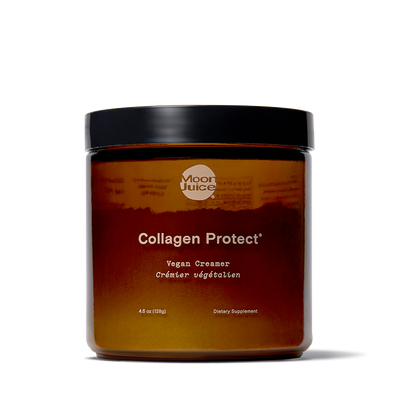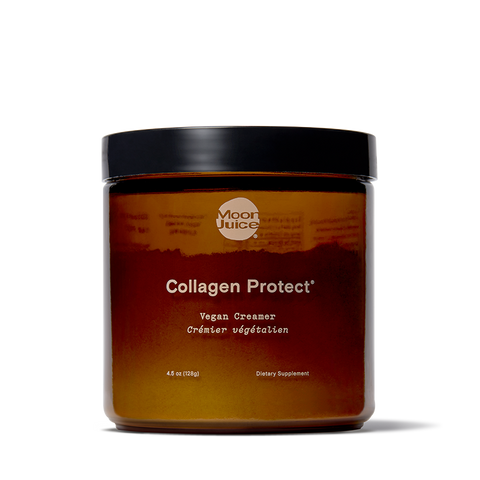If you’re interested in supporting your overall health or have a Collagen deficiency, you’ve probably considered taking a Collagen supplement.
Collagen makes up 30% of your body’s total protein and acts as the foundational building blocks for skin, muscles, ligaments, tendons, and bones. It gives our bodies structure, from organs and blood vessels, to the lining of our intestines. However, as Collagen naturally breaks down with stress and time, it makes sense to seek out a Collagen supplement to support our health holistically. But how much Collagen is too much?
In this article, we’ll demystify this valid question, uncover the potential side effects of excess Collagen consumption, and share simple ways you can begin effective and balanced Collagen supplementation.
How Much Collagen is Too Much?
So, can you take too much collagen? With the lack of FDA regulation on capsule and powdered Collagen supplements, there’s no set-in-stone guideline when it comes to the appropriate amount. To determine how much Collagen is too much, start by checking the recommended dosage on your product bottle. Aligning your Collagen intake with the nutritional guidelines created by the supplement maker is a good first step.
Since Collagen is a type of protein, consider the Recommended Daily Allowance (RDA) for protein (which is .8 grams per kilogram of body weight for a healthy adult with minimal physical activity). But keep in mind that studies suggest for people with varying physical activity levels, consuming 1.0, 1.3, and 1.6 g of protein per kg of body weight per day is recommended for minimal, moderate, and intense physical activity. Following these protein recommendations may help to avoid consuming too much Collagen.
Meanwhile, scientific studies have found a daily dose of 2.5-15 grams of Collagen is generally safe and effective, with no major adverse side effects reported in small-scale research. Ultimately, check the label, keep RDA in mind, consider your activity level, and pay attention to your body whenever you’re taking a dietary supplement. If you experience new Collagen side effects, it might be an indication of too much of this nutrient.
What Happens if You Take Too Much Collagen?
If you’ve taken powdered Collagen to bolster your health but are experiencing discomfort afterward, you might be exceeding the appropriate dosage. While scientific studies haven’t reported severe symptoms, mild to moderate side effects have been noted. That’s why it is crucial to know what side effects are associated with too much Collagen so you can adjust your dose if needed. Here’s what can happen if you take too many Collagen protein supplements:
Nausea
If Collagen is consumed too quickly or at too high of quantities, it introduces a major dose of protein to the body and causes the stomach to increase its acid to support protein breakdown. This increased stomach acidity can translate to nausea or queasiness, making it important to introduce Collagen gradually to avoid overwhelming the digestive system.
Heartburn
While supplemental Collagen may help improve hair growth and skin elasticity, excess Collagen intake can potentially lead to heartburn. Some study participants who consumed Collagen reported experiencing heartburn and this discomfort may arise due to the increased production of stomach acid associated with protein consumption. However, conflicting findings exist! A separate study has suggested that participants supplementing with Collagen experienced improvements in digestive issues, including heartburn. Individual responses may vary so monitor your body's reactions.
Bloating
Without a gradual increase in dosage, a sudden introduction of Collagen into your diet can trigger bloating. The body needs time to adapt to this new nutritional source and produce the acids and enzymes necessary to break down Collagen efficiently. This side effect is often mild and can go away on its own but consider a smaller Collagen dosage to minimize this uncomfortable experience.
Stomach Pain
The swift change in stomach acidity as the body processes this dietary supplement may cause stomach pain, especially in people with a history of gastrointestinal challenges. One study found that participants who reported stomach pain after taking Collagen had pre-existing gastrointestinal concerns.
Changes in Bowel Movements
Too much Collagen may manifest as changes in your poop, including constipation and diarrhea. Because Collagen is rich in amino acids, it helps to consume fiber along with it. Too much protein and too little fiber can lead to constipation, while rapid collagen processing may lead to diarrhea. To avoid this, try taking less Collagen and pair it with fiber.
Skin Irritation
Skin irritation, such as rash or itchiness, can occur after taking too much Collagen (especially animal-based Collagen) which could indicate an unknown allergy or sensitivity. Approximately 2-4% of the population may have preexisting sensitivity to bovine Collagen and 1% may react to Collagen in general (regardless of animal or vegan collagen options). Taking too much Collagen, or having a Collagen allergy or sensitivity can result in skin irritation, so consider taking a vegan Collagen builder or connect with your health practitioner to see if you have any underlying allergies or sensitivities.
Dizziness
Dizziness is not commonly reported as a side effect of too much Collagen but some study participants have noted this uncomfortable experience as a result of Collagen supplementation. If dizziness is experienced after consuming Collagen, don’t dismiss it — connect with your health practitioner!
Insomnia
Struggles with insomnia are not often reported, but some individuals participating in small studies have experienced this unwelcome effect. However, contrary studies have shown that Collagen’s amino acids can help improve sleep by reducing awakenings. If insomnia is experienced, find out if it’s related to Collagen or something else by consulting with your healthcare practitioner.
Liver Issues
Liver issues after Collagen supplementation are very rare. If any symptoms appear that suggest liver challenges, discontinue Collagen protein use and seek out medical care.
If you experience any of these Collagen side effects and are unsure if you’re taking too much Collagen, chat with your doctor, they’ll consider your larger health picture to determine the cause of those symptoms and let you know how much Collagen, if any at all, is right for your unique health goals.

Building Your Own Collagen With Moon Juice
Collagen supplements come in various forms, and they’re not all created equal. While animal-based Collagen provides complete Collagen, vegan Collagen supplements offer the body the essential building blocks to create its own supply naturally. Vegan Collagen works by supporting your own natural Collagen production. Look for a formula that includes functional ingredients that can enhance your body's Collagen-building capabilities and contribute to your overall skin health.
Take Collagen Protect
Add Collagen Protect to your routine — it’s a vegan Collagen creamer and skin supplement designed to protect and preserve your natural Collagen. It contains three key ingredients (all sustainably sourced) that work synergistically to increase and retain Collagen levels:
- Hyaluronic Acid: Clinically shown to support collagen synthesis and reduce the appearance of fine lines.
- Silver Ear Mushroom: Works to support your skin barrier and promote deep skin hydration.
- Tocos: Rich in essential fatty and amino acids, helping to protect Collagen.
Here’s how to use this collagen powder: Add 1 tablespoon of this skin-protecting creamer to your tea, coffee, or smoothies to promote healthy skin, preserve natural collagen synthesis, improve skin elasticity, and minimize the appearance of fine lines.
Takeaways
Ultimately, you can take too much Collagen and finding the right dose is not so straightforward since the FDA does not have any rigid dosage recommendations. By checking the label, keeping RDA in mind, and considering your physical activity and body’s reactions, you can avoid taking too much Collagen. If you’re looking for a high quality Collagen supplement that helps you build your own Collagen levels naturally, look for a vegan option, like Collagen Protect.
Navigating the supplement world of Collagen may seem a bit tricky, but with a bit of knowledge, you're better prepared to find your sweet spot. Remember, it's not just about what you consume but how your unique body responds. So, listen to your body's signals, consult with your healthcare provider, and enjoy the benefits of Collagen with confidence.
Sources
- Cleveland Clinic, Collagen https://my.clevelandclinic.org/health/articles/23089-collagen
- Royal Society of Chemistry, Dietary Protein Intake and Human Health https://pubs.rsc.org/en/content/articlelanding/2016/fo/c5fo01530h
- National Library of Medicine, Effects of hydrolyzed collagen supplementation on skin aging: a systematic review and meta-analysis https://pubmed.ncbi.nlm.nih.gov/33742704/
- MDPI, Significant Amounts of Functional Collagen Peptides Can Be Incorporated in the Diet While Maintaining Indispensable Amino Acid Balance https://www.mdpi.com/2072-6643/11/5/1079
- National Library of Medicine, A Collagen Supplement Improves Skin Hydration, Elasticity, Roughness, and Density: Results of a Randomized, Placebo-Controlled, Blind Study https://www.ncbi.nlm.nih.gov/pmc/articles/PMC6835901/
- National Library of Medicine, Symptomatic and chondroprotective treatment with collagen derivatives in osteoarthritis: a systematic review https://pubmed.ncbi.nlm.nih.gov/22521757/
- National Library of Medicine, Effect of a Daily Collagen Peptide Supplement on Digestive Symptoms in Healthy Women: 2-Phase Mixed Methods Study https://www.ncbi.nlm.nih.gov/pmc/articles/PMC9198822
- Wiley Online Library, Tolerability and efficacy assessment of an oral collagen supplement for the improvement of biophysical and ultrasonographic parameters of skin in middle eastern consumers https://onlinelibrary.wiley.com/doi/10.1111/jocd.15700
- National Library of Medicine, Collagen peptide supplementation before bedtime reduces sleep fragmentation and improves cognitive function in physically active males with sleep complaints https://pubmed.ncbi.nlm.nih.gov/37874350/
- American Academy of Allergy Asthma & Immunology, Bovine collagen allergy https://www.aaaai.org/allergist-resources/ask-the-expert/answers/2022/bovine
- Journal of Drugs and Dermatology, Oral Collagen Supplementation: A Systematic Review of Dermatological Applications https://jddonline.com/articles/oral-collagen-supplementation-a-systematic-review-of-dermatological-applications-S1545961619P0009X/
- The Royal New Zealand College of General Practitioners, Collagen supplements https://www.publish.csiro.au/hc/pdf/HC15947
- National Library of Medicine, Animal, Plant, Collagen and Blended Dietary Proteins: Effects on Musculoskeletal Outcomes https://www.ncbi.nlm.nih.gov/pmc/articles/PMC7551889/














